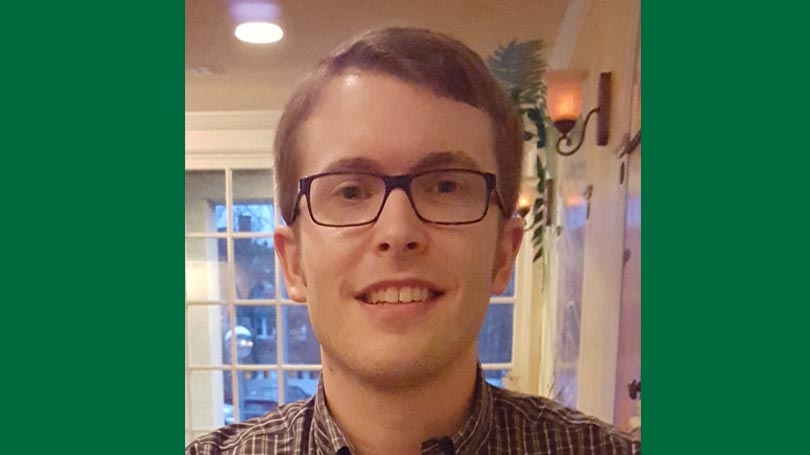
Michael Stevenson, PhD Chemistry '17, now a post-doctoral fellow with Hannah Shafaat in the Department of Chemistry and Biochemistry at Ohio State University
The Teaching Award is presented annually to the individual who best exemplifies the qualities of a college educator. The recipient is selected from nominations submitted by faculty to the School of Graduate and Advanced Studies.
Michael Stevenson successfully defended his thesis on September 8, 2016 and is currently a post-doctoral fellow with Hannah Shafaat in the Department of Chemistry and Biochemistry at Ohio State University. He received a B.S. in Biochemistry from the University of Washington, Seattle.
During a gap year between undergraduate and graduate training, Michael took the opportunity to be a teaching assistant in General Chemistry for two terms. It was this experience that planted the seeds for his creative and challenging approach to teaching and led him to be given a teaching assistant assignment in his first fall term at Dartmouth—a position usually undertaken during the winter term for incoming graduates.
His dedication to science education is evident in both the glowing student reviews he regularly receives and in his conscientious application of pedagogy as a mentor to students and faculty from Dartmouth and other schools. He undertook leadership roles during his time in the lab at Dartmouth, including mentoring four undergraduate students with their research projects. Additionally, his teaching was recognized by Professor Rachel Austin from Bates College, a regular collaborator of Dean Wilcox, who invited him to teach one of her classes at Bates.
"Few, if any, who have spent time in my lab over the past 5 years, have not benefited from the advice, training, and teaching that Michael has generously provided," wrote his supervisor Professor Dean Wilcox in his nomination letter. Michael's dedication to bringing out the best in his students and inspiring them to find the best in themselves, makes him a worthy recipient of the 2017 GRAD Teaching Award. Congratulations!
We asked Michael to tell us more about his program, his approach to teaching and what advice he would give to others starting a teaching assignemnt. Here are his responses:
Tell us about your program and research interests:
I earned my thesis from the Department of Chemistry where I studied how metals and proteins interact with each other. Metals are an essential part of life because they provide structure and function to many different proteins. Understanding how the metals interact with their protein partners can be challenging. To help understand this process, I used a technique called isothermal titration calorimetry (ITC) to measure how strong of a grip, or binding affinity, proteins have for different metals and this provided fundamental insight into how cells maintained the correct balance of metals that they need to survive.
What brought you to Dartmouth?
I was first drawn to Dartmouth because of the biophysical research that the Chemistry Department offered. I then chose Dartmouth because of the Chemistry faculty and graduate students. From the moment that I entered Burke during my visitation weekend I was instantly welcomed by all in the department, and it felt like home. The research conducted here is top-notch, and the professors are phenomenal mentors from whom I have learned how to be a more effective teacher and mentor.
How do you effectively translate your passion for your work/research into your teaching?
Research and teaching go hand in hand. I would draw from my research experience to provide real world examples to show students that what they are learning does have applications to solving real world problems. At the same time, watching the students learn and hearing their insightful questions made me energized and inspired my research. Teaching and research are interwoven, and I greatly enjoy doing both together.
What is a memorable moment in your teaching experience?
One of the best moments for me is when a concept clicks with a student. I love seeing the 'aha' moment when they begin to understand an idea that has previously eluded them. The instant I see it click, I take in the moment when the student's confusion is erased from their face. This is my most exciting and memorable aspect of teaching.
What skills did you learn as a teacher that you might not otherwise have had access to?
I have learned how to effectively communicate science. The ability to distill the fundamental aspects of a concept and relate them to an audience who does not have much background in the field is one of the most challenging aspects to teaching. The experience provided here at Dartmouth while being a TA, the classes offered by the Dartmouth Center for the Advancement of Learning (DCAL), and watching how the chemistry professors explain concepts, were integral for me in becoming a more effective teacher. I also learned other important skills like providing real-life examples and teaching in a fun and engaging manner. All of these skills will translate well into my future profession.
What did you learn from your students?
Education is two-way street because the teacher can learn just as much from the student as the student from the teacher. My students taught me how to make lab fun and engaging. They also helped me to see that using applicable examples tailored to each student can illustrate the concept better than just a generic response.
Advice for others who are starting to take on teaching assignments?
Learning should be fun and if you and your students are having fun, then learning is engaging. It is okay to try different teaching techniques. In fact, DCAL taught me a variety of teaching techniques that complement different learning styles, and this knowledge allowed me to improvise better while teaching to find how to best reach the student. I would also watch your professors because they are great at teaching, and I would ask them for advice when you need it. They are your biggest ally. Dartmouth is known for its amazing professors.